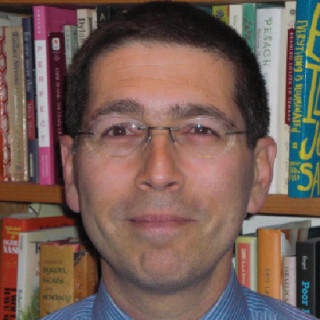In 1905, the American writer O. Henry published a story called “The Last Leaf.” In the story, a young artist named Sue lays dying in Greenwich Village during a pneumonia epidemic. As her remaining days dwindle, she spies an ivy tree outside the window pressed against a wall opposite her building. As summer turns to autumn, the leaves on the tree begin to dry up and fall. Sue fears that when the last leaf drops from the tree, her time will also dry up and she will be gone by the coming winter. A loyal but not very successful older artist friend named Behrman comes up with a ploy. To give Sue strength, he paints, under cover of night, a single leaf on the wall opposite her window that looks exactly like a real leaf clinging to the tree for dear life. Behrman is such a talented but unrecognized painter that the ruse works, and she gains strength and survives; Behrman and his art become her saviors.
This story came back to me some years ago, when I cared for an ALS patient in our nursing home whom I will call Benny. Though only in his 60s, Benny was in the stage of his disease that made independent life too challenging and scary. He had coughing fits and swallowing challenges that left him weak and shaken. He had been divorced and was the father of several devoted children, but each had their own life and could not rush over to take care of him at the drop of a hat. On his wall, after he settled into our nursing home, Benny hung pictures of his football days in college, his marathons later in life, and his burgeoning family. He was an inviting, gregarious man and, despite some prickliness, a resident favorite. He soon became the self-appointed 'mayor' of his unit and would sweep around in his power chair to the much older residents’ rooms at the slightest whiff of trouble to summon nursing help. Some called him 'the wheelie rescue squad.'
As time moved on through fall and winter, Benny’s care became more challenging, and he would often stop me (though I was not his PCP — only the medical director of the facility) to chat and update me on his condition. I listened when I could and scraped for good news to inspire him. When necessary, I would curbside his busy PCP or nurses to get an objective sense of his condition and trajectory. Given the usual path of ALS, I struggled and sometimes I dashed down a side hall to avoid Benny but to no avail; he always found me. Then it came to me — Lonnie!
Years before I’d met Benny, I’d had a buddy named Lonnie from my town with whom I used to go biking and hiking. Despite some emotional challenges, Lonnie was whippet-like in his physique and fit as a fiddle. Not long ago, however, Lonnie had also been diagnosed with ALS. By this time, he had moved to New York City, where he negotiated not only the streets of the Upper West Side (granted, on his power scooter), but also (after being lifted and scooped into the water by city staff) the laps of the local public pool.
I hit paydirt with Lonnie’s story, and Benny would thrill to hear of Lonnie’s escapades. The more I saw Benny’s enthusiasm, the more I was in touch with Lonnie. I did here and there embellish the facts. One lap in the pool became five, and a slow ride in the power chair a few blocks in Manhattan became a circumnavigation around the island. The ethics of my deception — the metaphorical painting of the leaf — began to gnaw, but whenever I thought of dialing it back, I imagined the forlorn look on Benny’s face. The idea of wiping off his ALS-impaired smile seemed to me a violation of the axiom “first, do no harm.”
My behavior with Benny, and that of the painter in the O. Henry story, can be attributed to the medical ethics concept of “therapeutic privilege.” In a nutshell, the concept is that one may shade or hide the truth from a patient if the calculation is that the truth will cause psychological damage. Though a 2004 piece published by the American Medical Association (AMA) notes that therapeutic privilege is “an exemption from informed consent guidelines and is, most would say, a frank exercise of paternalism,” it also stipulates that “physicians may withhold information about a patient's diagnosis or treatment when disclosing it would pose a serious psychological threat, so serious a threat as to be medically contraindicated.”
Across history, various cultures have practiced this concept of metaphorically painting the leaf. I myself wrote of this in regards to the culture of cancer care in 1980s Japan, and I recently saw another example (albeit fictional) from 1930s Scotland in the PBS show “All Creatures Great and Small.” In the show, a rural veterinarian chooses to hide the death of a beloved pet parakeet from its aging and blind owner and stealthily replace it with another very alive budgie. The ruse works, or does it? Does any ruse like this hold up against our current sense of ethics and truth-telling to patients? In 2016, the AMA code was updated more strictly to counsel against holding back information. Still, wiggle room remains: “Assess the amount of information the patient is capable of receiving at a given time, and tailor disclosure to meet the patient’s needs and expectations in keeping with the individual’s preferences.” You be the judge. Was I in-bounds or out of bounds?
As you might imagine, the Lonnie/Benny tale ended sadly. Despite Lonnie’s physical derring-do, he died ‘suddenly.’ I am not aware of the circumstances around his passing, nor did I ask his family at the funeral. I expected within days to run into Benny and wrestled with what to say. Our hallway chats for some time now began with an update on the world of Lonnie. Could I invoke therapeutic privilege? Or should I somehow appeal to Benny’s own agency and ask him if I should at last be candid when apprising him of Lonnie?
Benny was by this time losing weight, had suffered more terrifying paroxysms of coughing, and was found often in the rehab gym talking to his favorite speech therapist about his fears of choking. In seeking to inspire Benny, I took the privileged therapeutic route and continued to paint an O. Henry leaf on the wall. In our conversations, my late friend Lonnie remained alive, and Benny for his part continued to astound family and friends with his own longevity.
Not long after this, however, Benny too died ‘suddenly,’ found in his room. Unlike in “The Last Leaf,” my ruse did not work. Still, I feel that it was worthwhile: He had already decided against aggressive care, so I didn't feel that I was interfering with facts on the ground. In addition, the aforementioned AMA article disclosed that others with greater insight into medical ethics than I would have chosen similarly. And finally, in hearing of Lonnie, Benny was able to experience a bit of joy in the course of an otherwise joyless disease.
Nevertheless, the question of what is ethically right weighs heavy on me to this day. Even years out from this situation, I continue to struggle with my deception, especially in light of my work in nursing homes with frail and compromised residents as they approach the end. I am sometimes the only clinician that sits with the resident and family and tells the whole unvarnished and joyless truth. Most families are grateful, but not all. Some take exception to my removing “hope” and even nurturing potential depression. In such emotionally fraught instances, you could say the call for therapeutic privilege takes on a heightened urgency — which can turn something that feels ethically murky in theory into something that feels humane in practice.
When Benny died, he did so in a way that did him justice: without the feeding tube that he had bravely declined but with the adulation of dozens of residents and staff. His memorial service some weeks later at the nursing home was attended by so many. His family wept, not so much at losing Benny (they knew that would happen) but at the tender loving comments offered by all. Benny’s strength was itself an inspiration — even if his leaf ultimately fell.
Have you ever lied or told an untruth to a patient in the service of ‘therapeutic privilege”?
Dr. Schor is a geriatrician specializing in long-term and post-acute care. He was medical director and attending physician at Daughters of Israel for close to 30 years and is now a Senior Medical Director at Optum Health. He is a new grandfather, an avid birder, and lives in Millburn, NJ. Dr. Schor is a 2022–2023 Doximity Op-Med Fellow.
Names and identifying details have been modified to protect patient privacy.
Image by Alphavector / Shutterstock







